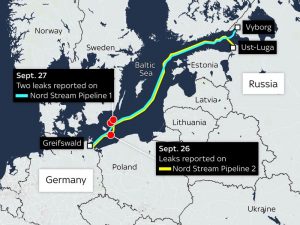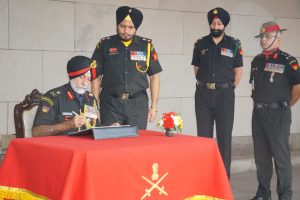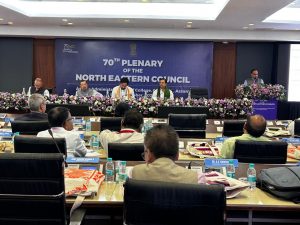Today Current Affairs:11th October 2022 for UPSC IAS exams, State PSC exams, SSC CGL, State SSC, RRB, Railways, Banking Exam & IBPS, etc
Table of Contents
Nord Stream Pipelines:

Leaks were found in the pipelines comprising the Nord Stream pipelines (Nord Stream 1 and Nord Stream 2) located near Denmark and Sweden.
- The leaks happened just before the ceremonial launch of the Baltic Pipe carrying gas from Norway to Poland, which is an effort by Poland to decrease its dependence on Russia for energy.
- Nord Stream consists of two pipelines, which have two lines each.
- Nord Stream 1 is a 1,224 km underwater gas pipeline running from Vyborg in northwest Russia to Lubmin in northeastern Germany via the Baltic Sea. It was completed in 2011.
- Nord Stream 2 which runs from Ust-Luga in Leningrad to Lubmin was completed in September 2021 and has the capacity to handle 55 billion cubic meters of gas per year once it becomes operational.
- The twin pipelines together can transport a combined total of 110 billion cubic metres (bcm) of gas a year to Europe for at least 50 years.
- The Nord Stream crosses the Exclusive Economic Zones (EEZs) of several countries including Russia, Finland, Sweden, Denmark and Germany, and the territorial waters of Russia, Denmark, and Germany.
- In Germany, the pipeline connects to the OPAL (Baltic Sea Pipeline) and NEL (North European Pipeline) which further connects to the European grid.
Global Artificial Intelligence Summit And Awards:

The Union Minister of Commerce and Industry addressed the 3rd edition of Global Artificial Intelligence Summit & Awards (GAISA), and articulated that Artificial Intelligence can help India be a developed nation by 2047.
GAISA:
- The third AI Summit has been organized by AICRA (All India Council For Robotics & Automation) and is focusing on the areas of defence, healthcare, agriculture, smart cities, mobility and education in partnership with the government.
- AICRA sets up standards in the robotics & automation and education industry, helping organizations and professionals to solve difficult technical problems, while enhancing their leadership and personal career capabilities.
- GAISA-Global Artificial Intelligence Summit focuses on the prominence of AI in human lives & business industries.
- The aim is to develop a roadmap on how to use the AI ecosystem and startups for the benefit of society.
- It has set up multidisciplinary groups to break down the silos in which different stakeholders have been working and to find technological solutions for the key sectors of our society.
Climate Tipping Points:

According to a major study, the climate crisis has driven the world to the brink of multiple “disastrous” tipping points.
- Climate Tipping Points or CTPs are markers of a larger climate system which when triggered beyond a threshold, perpetuates warming on its own.
- According to the Study, five dangerous tipping points may already have been passed due to the 1.1 o C of global heating caused by humanity to date.
- These include the collapse of Greenland’s ice cap, eventually producing a huge sea level rise, the collapse of a key current in the north Atlantic, disrupting rain upon which billions of people depend for food, and an abrupt melting of carbon-rich permafrost.
- At 1.5o C, five tipping points become possible, including changes to vast northern forests and the loss of almost all mountain glaciers, the die-off of tropical coral reefs and changes to the west African monsoon.
- In total, the researchers found evidence for 16 tipping points, with the final six requiring global heating of at least 2o C to be triggered.
- The tipping points would take effect on timescales varying from a few years to centuries.
- At more than 2o C, the nine global tipping points identified are the collapse of Greenland, West Antarctic, and two parts of the east Antarctic ice sheets, the partial and total collapse of Atlantic Meridional Overturning Circulation (AMOC), Amazon dieback, permafrost collapse and winter sea ice loss in the Arctic.
- Other potential tipping points still being studied include the loss of ocean oxygen and major shifts in the Indian summer monsoon.
PM-National Apprenticeship Mela:

Central Government to organise PM-National Apprenticeship Melas on October 10
- It is being organised by the Ministry of Skill Development and Entrepreneurship, as part of the Skill India Mission to boost career opportunities and practical training among the youth.
- Every month, the apprenticeship mela will be hosted wherein selected individuals will receive a monthly stipend in accordance with government criteria for gaining new skill.
- To be eligible to apply, the students must have a 5th-12th grade pass certificate, a skill training certificate, an ITI Diploma, or a graduate degree to participate.
- Candidates will also earn National Council for Vocational Education and Training (NCVET)-recognized certifications, improving their employability after the training.
- The National Apprenticeship Promotion Scheme (NAPS), launched in 2016, aims to promote apprenticeship training in the country by providing stipend support to the apprentices, undertake capacity building of the apprenticeship ecosystem and provide advocacy assistance to support rapid growth.
- Objectives:
- To develop skilled manpower for the industry by promotion of on-the-job experiential training.
- To encourage establishments to enrol apprentices by sharing partial stipend support to the apprentices.
- To provide up-skilling opportunities for candidates who have undergone short-term skill training.
- To encourage enrolment of apprentices in small establishments (MSMEs), and those located in under served areas like in aspirational districts and in North-East region.
73rd Raising Day Of Territorial Army:

The 73rd Raising Day of Territorial Army was celebrated across the country on October 9.
- It aims to commemorate its raising by the first Governor General C Rajagopalachari on this day in 1949.
- The Territorial Army (TA) was raised by the Britishers in 1920 through Indian Territorial Act of 1920 and it was org into two wings namely – ‘The Auxiliary Force’ for Europeans & Anglo-Indians and ‘The Indian Territorial Force’ for Indian Volunteers.
- After Independence Territorial Army Act was passed in 1948 and the Territorial Army was formally inaugurated by the first Indian Governor General Shri C Rajagopalachari on 09 Oct 1949.
- The Territorial Army is part of Regular Army and its present role is to relieve the Regular Army from static duties and assist civil administration in dealing with natural calamities and maintenance of essential services in situations where life of the communities is affected or the Security of the Country is threatened and to provide units for Regulars Army as and when required.
- Eligibility:
- Any citizen between the age of 18-42 can be a part of the service.
- The pensionable age for a soldier below officer’s rank in the TA is the same as that of a regular soldier — 15 years.
- The TA units were also actively involved in operations during the 1962, 1965 and 1971 wars.
- Since 2020, the Indian military has been recalibrating the TA for better operational and intelligence roles, especially in the Andaman Islands to keep an eye out for possible Chinese intrusions in the region.
- The motto of the Territorial Army of India is ‘Savdhani Va Shoorta’ (Vigilance and Valour).
Manesar Anti-terror 2022:

India is currently hosting the multilateral anti-terror exercise ‘Manesar Anti-terror 2022’ scheduled from October 8 to 13.
- It is under the framework of Shanghai Cooperation Organisation (SCO) Regional Anti-Terrorist Structure (RATS).
- It is stage 2 of the exercise and the Stage-1 of the Exercise was conducted from July 27 to August 1 by the National Counter Terrorist Forces of SCO Member Countries in their respective territories.
- The exercise is aimed at exchanging expertise, best practices and build synergy between the Counter Terrorism Forces of the SCO RATS Member Countries to enhance capabilities for conducting Anti-Terrorist operations and countering other security threats collectively.
- Regional Anti-Terrorist Structure (RATS) one of the permanent organ of the Shanghai Cooperation Organisation and has its headquarters in Tashkent, Uzbekistan.
- The objective of SCO RATS is to facilitate cooperation and coordination against Terrorism, Extremism and Separatism.
- India assumed the chairmanship of the Council of SCO RATS in Oct 2021.
- Joint Anti-Terror Exercise (JATE) is an annual Counter Terrorist Exercise held within the framework of the SCO RATS.
- The SCO is an eight-member economic and security bloc that India and Pakistan joined as full-time members back in 2017.
- The founding members of this group include China, Russia, Kazakhstan, Kyrgyzstan, Tajikistan, and Uzbekistan.
National Industrial Corridor Development Corporation:

4th NICDC Investors’ Roundtable Conference to be held in Mumbai.
- The 4th NICDC Investors’ Roundtable Conference organized by Maharashtra Industrial Township Limited (MITL).
- The Investors Roundtable Conference has previously been hosted in Delhi, Kochi, and Ahmedabad.
- The 4th edition of the conference will showcase the development of upcoming greenfield industrial cities across India, which have been planned by National Industrial Corridor Development Corporation Limited.
- Currently, four such greenfield smart industrial cities are being developed in Maharashtra in the districts of Aurangabad, Raigad, Satara and Nagpur.
- National Industrial Corridor Development Corporation (NICDC) is a Special Purpose Vehicle aiming to develop new industrial cities as “Smart Cities” and converging next generation technologies across infrastructure sectors.
- The programme is aimed at providing impetus to planned urbanization in India with manufacturing as the key driver.
Meeting Of North Eastern Council:

The Plenary meeting of North Eastern Council concluded recently.
- NEC is not a constitutional body, but a statutory organization established in 1971 under the North Eastern Council Act, 1971.
Functions as Apex Regional Planning Body for the North Eastern Region. - It comprises Governors and Chief Ministers of all the 8 North-Eastern States and three members nominated by the President.
- In June 2018, Union cabinet approved the nomination of the Home Minister as the ex-officio chairman and Minister for DoNER (Development of North-East Region) as the council’s vice chairman.




